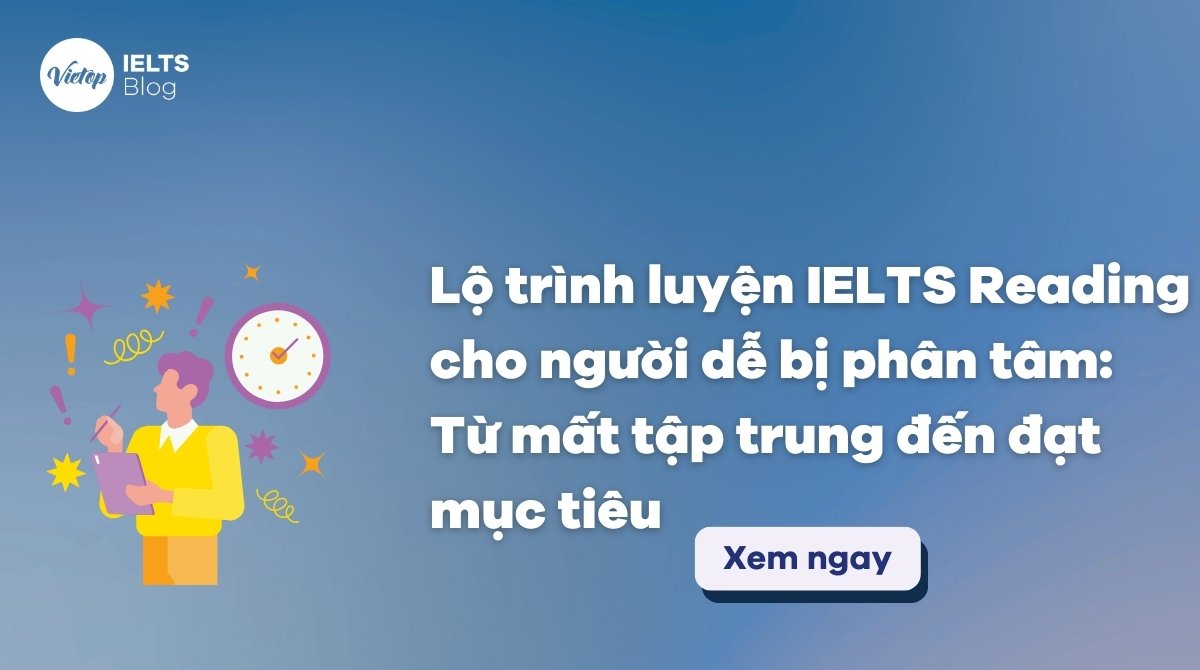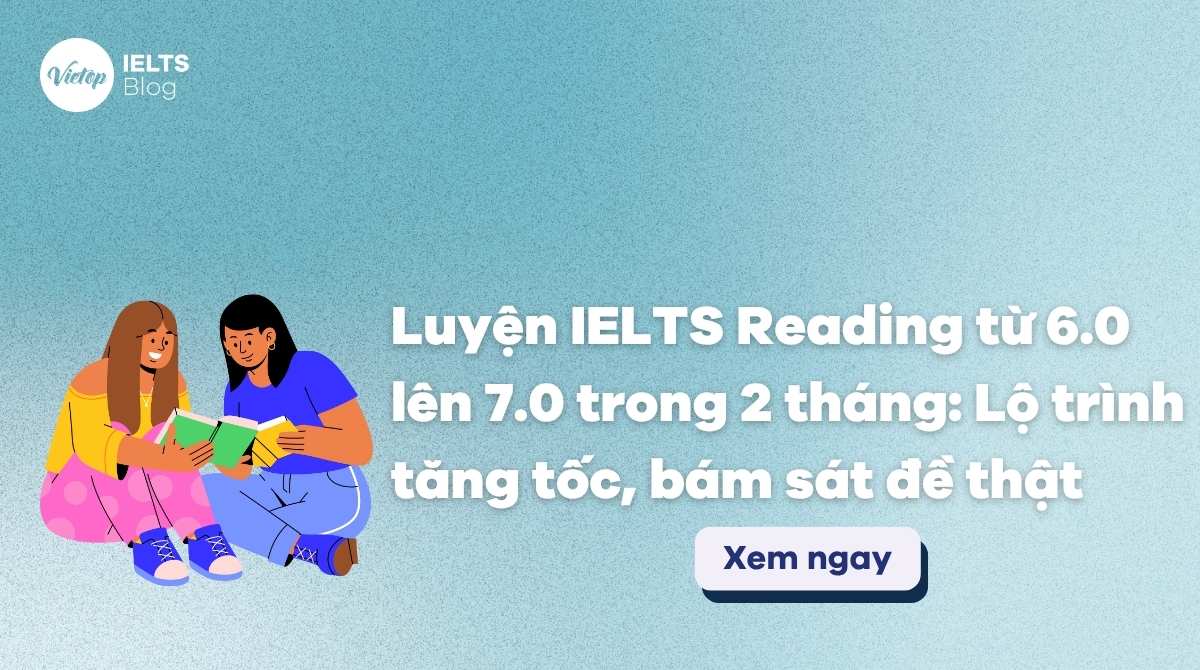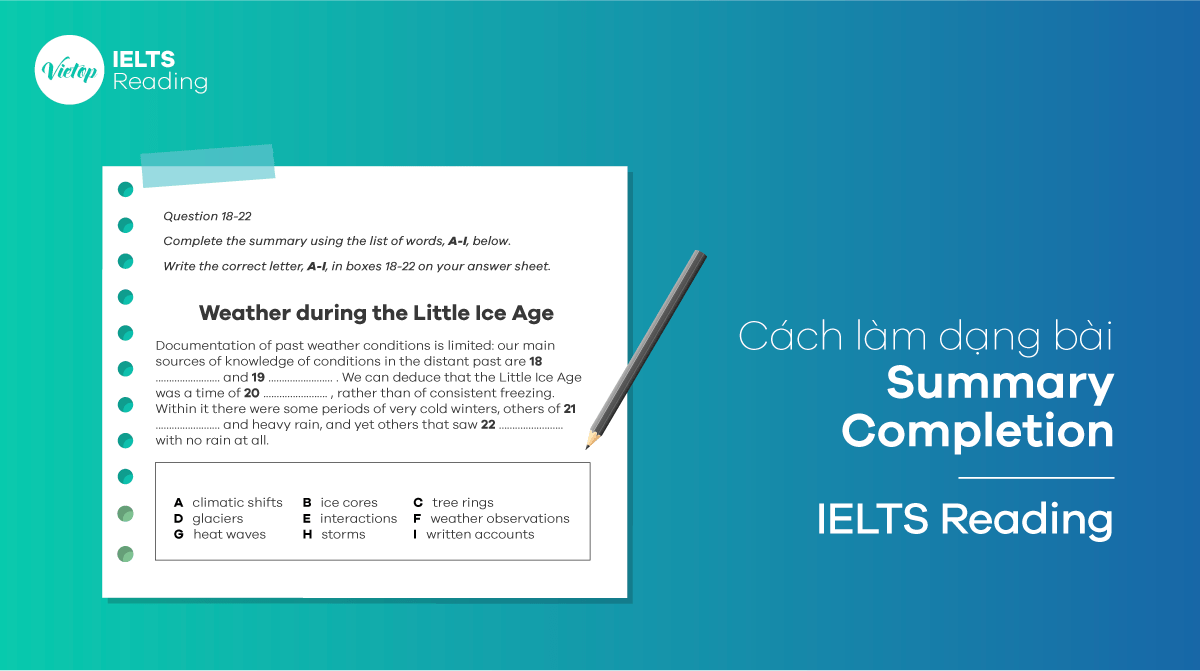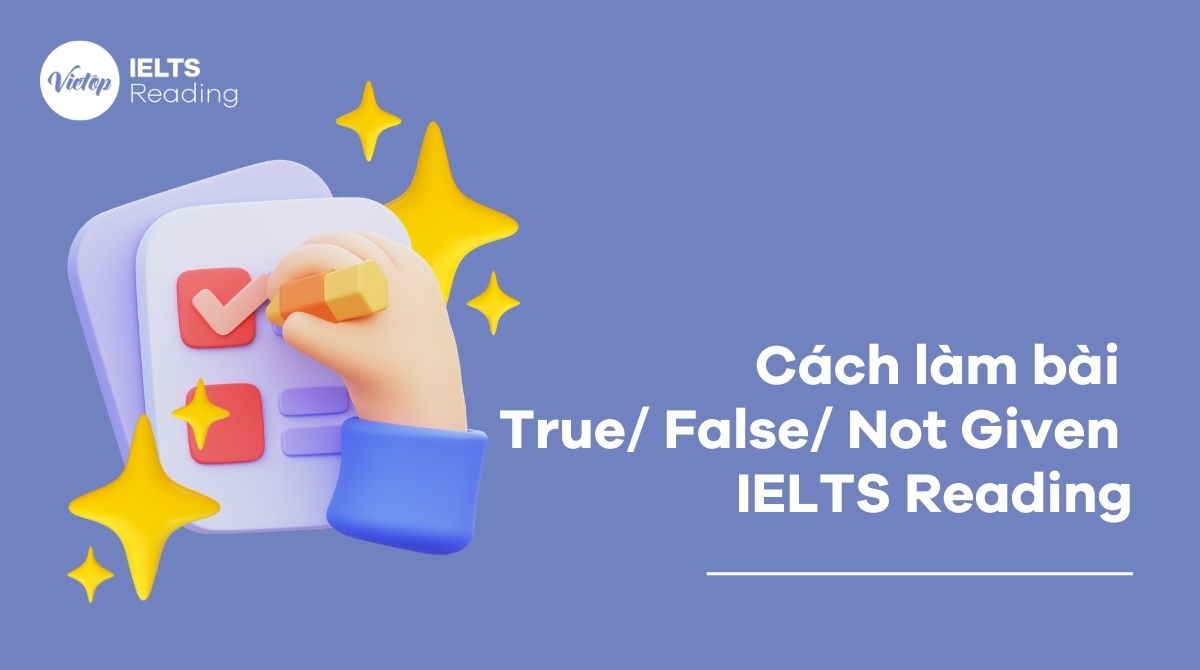Đối với các bạn học IELTS hiện nay, dạng bài Matching Sentence Ending đã trở nên rất quen thuộc. Tuy nhiên, cách làm dạng bài này hiệu quả, tránh sai sót thì không phải ai cũng biết. Bài viết này, Vietop English sẽ giúp bạn có cái nhìn tổng quan về dạng bài này cũng như hướng dẫn cách làm Matching Sentence Endings một cách hiệu quả nhất.
Tổng quát về bài tập dạng Matching Sentence Endings
Khái niệm
Matching Sentence Ending là một dạng bài tập trong phần Reading của bài thi IELTS. Dạng bài này đề bài sẽ cho hai nửa câu tách biệt, và điều bạn cần làm chính là ghép nó thành một sao cho có nghĩa và đúng với những gì có trong bài đọc.
Những khó khăn mà các bạn học IELTS thường gặp phải với dạng bài này như sau:
- Số câu trả lời được đưa ra nhiều hơn câu hỏi. Điều này sẽ khiến bạn dễ bị rỗi, băn khoăn và bị đánh lạc hướng.
- Khó xác định được đoạn văn có chứa các nội dung trong câu hỏi hoặc câu trả lời.
Vì thế, hãy cùng Vietop khám phá phương pháp làm bài hiệu quả nhé.
Hướng dẫn từng bước làm bài Matching Ending hiệu quả

Bước 1: Đọc kỹ đề bài, gạch chân hoặc highlight từ khóa
Bước đầu tiên chính là đọc kỹ đề bài để xác định yêu cầu. Đề bài sẽ đưa cho bạn nửa đầu tiên của câu. Hãy đọc kỹ và gạch chân những keyword đáng chú ý ở trong nửa câu đầu này để hình dung được nội dung của câu là gì.
Bước 2: Xác định thông tin thương thích được đề cập trong nửa đầu
Sau khi đã đọc kỹ và nắm được các từ khóa, hãy tra cứu các từ khóa đó ở trong bài đọc, để có thể định hướng được vị trí của câu hỏi trong đoạn văn của bài đọc.
Bước 3: Đọc hiểu kỹ thông tin đã định hướng trong bài đọc
VIệc tiếp theo chính là sử dụng kỹ năng đọc hiểu, hãy phân tích, làm rõ nội dung có chứa thông tin mà bạn cần, để tránh bị đánh lạc hướng bởi những thông tin gây nhiễu. Và cuối cùng là dò câu trả lời hợp lý nhất để điền vào phiếu trả lời.
Những ví dụ về dạng bài Matching Endings
Hãy tham khảo đề bài sau:
Waste disposal
Until now, Britain has opted for burying most of its rubbish. Around four fifths of municipal waste is sent to landfill sites. This approach has made considerate sense in an island with sites to spare because of its particular geology and its history of quarrying.
But landfill sites are getting scarce, particularly in southern England, where most people live. And they are becoming expensive to run as the government insists on safeguards against environmental hazards like the leaching of toxic waste into underground aquifers. But the biggest constraint on dumping stuff in landfill sites is Britain’s commitment to meet – about 60% of household rubbish – that is put into landfill sites. These targets are intended to cut emissions of methane (a greenhouse gas) and to reduce the risk of water contamination from landfill.
If you can’t bury it, an alternative is to burn it. This certainly seemed to be the initial thrust of government thinking a few years ago. A programme to build as many as 130 new incinerators was envisaged. But burning also entails environmental risks. Although new incinerators are now much cleaner than earlier ones, people are scared of exposure to dangerous chemicals like cancer-producing dioxins. The political difficulties in selling an expansion of incineration are immense.
Complete each sentence with the correct ending, A – G, below. Write the correct letter, A – G, in boxes 1 – 4 in your answer sheet.
1. The presence of old mines in Britain has
2. To make landfill sites safer, the authorities have
3. In order to comply with European targets, Britain has
4. Burning rubbish is not popular because people have
A. agreed to reduce waste levels.
B. destroyed most of the municipal waste.
C. encouraged rubbish burial.
D. released toxic waste
E. imposed safety laws.
G. become anxious about the pollution levels.
Hãy áp dụng hướng dẫn cách làm dạng bài này được đề cập trên đây để chọn đáp án đúng nhất nhé.
Những tips làm bài Matching Sentence Endings

Trước khi áp dụng được các tips làm bài hiệu quả, bạn cần nắm rõ những lỗi sai mình thường gặp khi làm bài để giải quyết.
- Thứ nhất, nhiều bạn chỉ dựa vào việc đoán nghĩa của cả câu mà vội vàng nối, không đọc lại thông tin trong bài. Như vậy, tỉ lệ thành công cho những bài tập này là rất thấp.
- Thứ hai, các bạn chỉ scanning các từ khóa có trong câu hỏi, thường trong các bài đọc khó, họ sẽ để những từ đồng nghĩa nên việc đọc nhanh sẽ khiến bạn bỏ qua thông tin.
- Thứ ba, không đọc kỹ và hiểu rõ ngữ cảnh của câu, đoạn văn trong bài khiến bạn hiểu sai nghĩa, từ đó chọn sai bởi những thông tin gây nhiễu.
Từ đó, ta có các tips làm bài như sau:
- Hãy đọc cả đề bài và nửa sau trong câu trả lời để xác định được thông tin trong đoạn dễ hơn. Tránh tập trung vào chỉ một thông tin sẽ khiến bạn xác định vị trí sai.
- Tìm kiếm những từ ngữ đồng nghĩa, liên quan đến keyword.
- Chú ý phân bổ thời gian làm bài một cách hợp lý.
- Hãy loại trừ các đáp án không đồng nhất về ngữ pháp trước, sẽ giúp bạn tránh bị rối bởi các thông tin sai.
Xem thêm: Mẹo làm bài Matching Headings trong IELTS Reading giúp bạn đạt điểm cao
Qua bài viết này, bạn đã nắm được những kỹ năng cơ bản để làm dạng bài Matching Sentence Endings. Tuy nhiên, để đạt được điểm số cao và tự tin hơn, bạn cần luyện tập thường xuyên và có sự hướng dẫn của chuyên gia. Đăng ký ngay khóa học IELTS cấp tốc để được hỗ trợ tối đa và đạt được mục tiêu IELTS của mình!
Bài tập
Questions 1 – 8
Complete each sentence with the correct ending A-J from the box below. Write only the letter. You do not need to use all of the sentence endings.
- Strawberries may help to
- In non-human tests fisetin was shown
- Specialists believe
- Fisetin has
- Mahar wants to soon begin
- Alzheimer’s is
- Almost a quarter of the world’s population is predicted
- A reduction in the number of cases of cognitive diseases suffered by the elderly will reduce
- A. to be over the age of 60 by the year 2050.
- B. may be described as a new superfood.
- C. to reduce swelling of an organ.
- D. an increasing problem around the world.E. been studied for over 10 years.
- F. more testing should be carried out to find out the benefits of fisetin.
- G. the predicted burden on health services in the future.H. cure diseases suffered by the elderly.
- I. controlled testing of fisetin on people.J. are highly toxic.
A COMPOUND IN STRAWBERRIES MAY PREVENT COGNITIVE DECLINE, RESEARCH SHOWS
A compound found in strawberries and other fruit may help prevent cognitive decline, new research shows. The findings may help prevent Alzheimer’s and other neurodegenerative diseases associated with aging.
Researchers at the Salk Institute for Biological Studies found that treating aging mouse models with fisetin, a compound found in strawberries, helped reduce brain inflammation and cognitive decline. The study, authored by Pamela Maher of the Cellular Neurobiology Laboratory at Salk, was published in The Journals of Gerontology Series A. “Companies have put fisetin into various health products, but there hasn’t been enough serious testing of the compound,” said Maher. “Based on our ongoing work, we think fisetin might be helpful as a preventative for many age-associated neurodegenerative diseases, not just Alzheimer’s, and we’d like to encourage more rigorous study of it.”
Maher has been studying the compound for more than a decade. Previous research has found that fisetin reduced memory loss caused by Alzheimer’s in mice, but that study was related to genetic Alzheimer’s. This form of the disease only accounts for 1-3% of cases.
In the team’s most recent study, they fed the prematurely aging mice a daily dose of the compound in their food for seven months. A separate group was fed the same food without fisetin. The team examined certain proteins associated with brain function, inflammation and stress response. After 10 months, Maher said the differences between the two groups was “striking.” Mice fed the fisetin compound had no noticeable differences in their behavior, inflammatory markers or cognitive ability. The group that was not fed fisetin had elevated markers of inflammation and stress, and had difficulty with cognitive tests. The researchers found no acute toxicity in mice treated with fisetin, even when given high doses of the compound.
While Maher acknowledges that mice are not people, she is confident that there are enough similarities to warrant a closer look at the compound. “We think fisetin warrants a closer look, not only for potentially treating sporadic AD, but also for reducing some of the cognitive effects associated with aging, generally,” said Maher. The next step, Maher hopes, is to partner with another company or group to conduct human trials of the compound.
Fisetin is currently sold as a dietary supplement, but those products are not regulated by the FDA. The team has also developed derivatives of the compound that may have enhanced properties, Maher says. “One of the advantages of those is that you can patent them,” she said. “The disadvantage is that to get them into a clinic, you have to go through a lot more regulatory hurdles.”
Maher and her colleagues have also collaborated on research related to other cognitive-protecting compounds. One of those compounds, J147, is almost ready for human testing. The paperwork is being filed with the Food and Drug Administration (FDA). The team is still in the negotiating phase of securing funding for a Phase 1 clinical trial. The J147 compound is derived from curcumin, a compound found in turmeric.
If proven effective and safe, fisetin may be used to help prevent Alzheimer’s and other forms of dementia, a growing problem as the world’s population continues to age. Aging is, according to the United Nations Population Fund (UNFPA), one of the most significant trends of this century. One in eight people in the world is over the age of 60. By 2050, UNFPA estimates that 22% of the population will be 60 and older. The Alzheimer’s Association estimates that there are 5.5 million people living with Alzheimer’s disease in the United States alone. Among those 5.5 million people, 5.3 million are 65 and older. Alzheimer’s disease in older individuals is closely linked with other medical issues, such as incontinence, which requires caregivers to take on the additional tasks of changing bed pads (or chux) and adult diapers.
As researchers continue to learn more about compounds and their cognitive-protecting properties, Alzheimer’s cases may begin to decline. A decline in Alzheimer’s and dementia may help reduce the expected shortage of medical care professionals needed to treat aging patients.
The research team is currently trying to secure clinical human trials, but such treatments will likely not be available to the public for years.
(Nguồn bài tập: Sưu tầm )
Answers:
1. H
2. C
3. F
4. E
5. I
6. D
7. A
8. G
Và trên đây, Vietop English đã tổng hợp và hướng dẫn những bước làm bài liên quan đến dạng bài Matching Sentence Ending, một trong những dạng bài khó nhằn trong IELTS Reading. Hi vọng qua bài viết này, các bạn sẽ cảm thấy làm dạng bài này dễ dàng, tránh bị sai sót.









